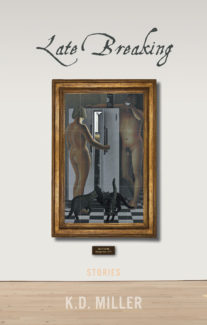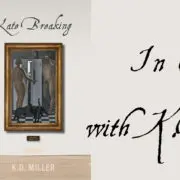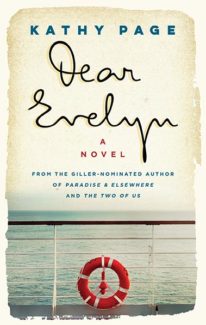 Trade Paper $19.95
Trade Paper $19.95
eBook $9.99K.D. Miller’s Late Breaking, a collection of stories inspired by the work of Alex Colville, hit shelves last week, and early reports demonstrate that readers are as captivated as your humble Biblioblogger by this brilliant new book from the author of Rogers Writers’ Trust finalist All Saints. We sat down with K.D. to learn more about its inspiration, as well as its relationship to her other work.
In Ottawa? K.D. is the featured reader at The Short Reading Series on Sunday, October 14. Join us downtown at The Gallery Bar at The Lieutenant’s Pump on Elgin Street at 4 pm!
Biblioasis: For those not already familiar with your work, can you tell us a little bit about yourself and your writing?
K.D. Miller: I have published seven books (including Late Breaking) –five collections of short stories, a novel and a collection of personal essays. My short story collections are linked – whether by theme or through recurring characters and situations. I like this form very much, as it gives me the freedom to revisit a personality or circumstance and see it from a very different angle. My novel, Brown Dwarf, had a similarly loose structure – the narrative point of view shifted back and forth from first to third, and the time frame from present to past. My collection of essays, Holy Writ, explored a favourite theme of mine – the link between creativity and spirituality. Right now I’m at work on a new book of essays that goes further in that direction. Recently I’ve started to publish single poems in literary journals, and my essay “The Death of Me” has been accepted for the summer issue of The New Quarterly as part of their Falling in Love With Poetry series. It describes how I came to poetry late in life and rather reluctantly, and includes four of my poems.
Though retired, I still write in the early morning, as I did for decades before leaving for work. I’m at my desk by 6 am at the very latest, and those couple of hours with my coffee and the view out my window are the best of the day.
B: Each story in Late Breaking is based on a painting of Alex Colville’s. Can you tell us a bit about what drew you to his work, and what inspired the idea of a book collection like this?
KDM: I had always liked the work of Alex Colville – his precise delineation, his almost-invisible brushwork, and above all the eerie, chill-down-the-spine effect of many of his paintings. (That black horse galloping toward the oncoming train captures perfectly what I’m talking about.) His paintings are extremely evocative. Many of his subjects either have their heads turned sharply away from the viewer or are looking the viewer disconcertingly straight in the eye. And you can take that kind of thing any way you like – as a challenge, as a cry for help, whatever. Even in his less disturbing paintings, nothing is entirely peaceful or at rest. You get the feeling that something memorable has just happened, or is just about to happen.
In 2014, the AGO mounted a major exhibit of Colville’s work, finding in it fascinating parallels with the Coen brothers’ films and the writing of Alice Munro. As I roamed from painting to painting, the phrase “the Colville stories” kept repeating in my mind like a mantra. I felt inspired – almost driven – to use those paintings as visual writing prompts. Their layers of possibility, their disturbing ambiguity left me convinced that I could pull stories out of them for the rest of my life. I actually felt blessed.
B: How does the collection relate (or not relate) to your last book All Saints?
KDM: All Saints is linked together by recurring characters who in one way or another find themselves inside a small, struggling urban church – the titular All Saints. When I started writing Late Breaking, I did not intend to have recurring characters. I had thought that the linkage would be one more of atmosphere, theme, imagery, etc. But then it occurred to me that the protagonist of one story simply must have been the long-time friend of the protagonist of another. And a minor character here was the neighbour or colleague of another minor character over there … And so on. The characters, in their way, let me in on a community that gradually formed under my hand.
There are other similarities too. Given my own interest in spirituality, it is not too surprising that one character in Late Breaking is an Anglican priest, and another the son of a United Church minister. Both books also deal with death as a significant theme – its mystery, and the way we do everything in our power to pretend it isn’t there waiting for us.
I think All Saints is a more closely-packed collection than Late Breaking. While I was writing the latter, I went further afield – both in terms of technique and setting. Fewer of the Late Breaking characters are dug out of myself, and more of them are people who, you might say, came to visit and let me get to know them.
In both cases, however, I became extremely fond of the community I greeted at my desk each morning, and missed them terribly once the books were finished.
B: The eponymous story “Late Breaking” juxtaposes both very funny CanLit satire with a heartbreaking story of loss, centered around a fiction writer named Jill Macklin. I’m wondering if you can tell us more about that character?
KDM: Well, I won’t pretend that there isn’t a big dollop of Jill in me and me in her. We’re about the same age, we both had day-jobs for many years that supported our fiction-writing on the side, and we both had the experience of being up for an award and nursing a broken heart at the same time.
That said, I want to emphasize that my own award-nomination experience was very different from Jill’s. The one she is up for – the Olympia Featherstone Award For Fiction – is purely a creature of the imagination, as is its rather crass competitor – the Biggar Prize. I wanted to put Jill smack in between two unrealities – a pedestal and a ditch, you might say – and give her a chance to find her way back to her true self.
One other thing that I hope the title story does is remind the reader that the elder heart can still break. It is as tender, brave and vulnerable as it ever was. Falling in love is as exhilarating for someone in their sixties as it is for someone in their twenties; and the failure of that love hurts them just as much, too.
In fact, if there is one thing I hope the collection Late Breaking can achieve, it is this understanding that our hearts stay young and open, right up until the end.
B: What are you reading right now?
KDM: Well, I just finished Philip Kerr’s Prussian Blue (I love murder mysteries!) and have just started May Sarton’s The House by the Sea – the journal she kept in the 1970s while living in a big old farm house on the coast of Maine. She is a marvelous diarist, and is just about my age at time of writing. Many years ago, I wrote two sentences which I have not been able to do anything with: “Old women belong by the sea. They have earned their place with the rocks and the foam.” May Sarton’s book is bringing those sentences back to me, like a mantra. Maybe it’s time to put them into an essay. Or a story. Or a poem.







